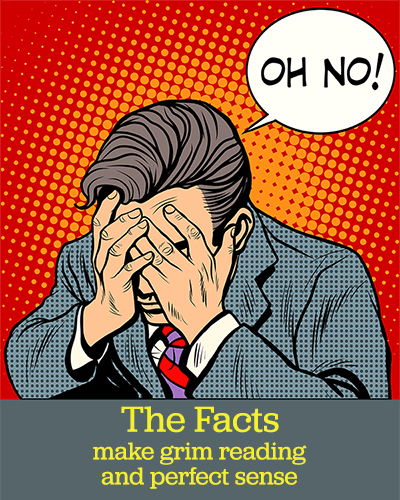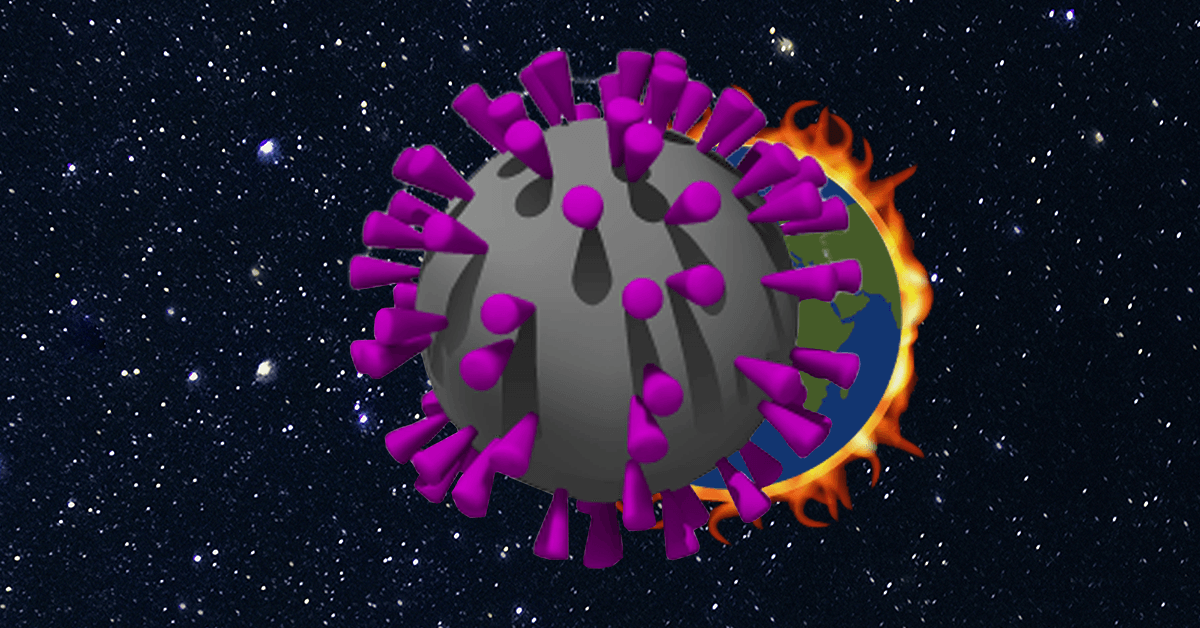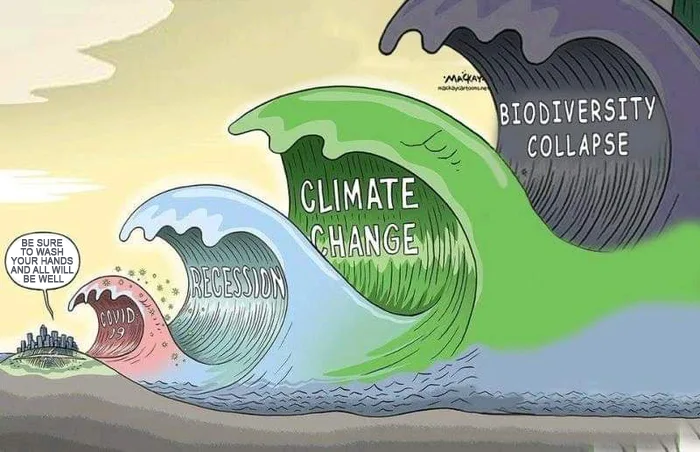We are in the midst of a vast, many-layered crisis, arguably the greatest threat that humanity has ever faced. It endangers our very existence. If we don’t solve it soon, hundreds of millions of people will perish in a matter of decades and we shall all suffer grievously, far into the future, or not survive at all. This is, of course, the environmental emergency. Most of our attention, energy and resources should be focused on solving this major existential problem. Instead we are obsessing about a minor pandemic.
A cure worse than the disease
The Covid 19 epidemic is a natural disaster and not a particularly aggressive one. Both its mortality rate and infection rate are low. At present (late December 2020) the number of deaths is about 1.8m, which is less than 0.03 per cent of the human population of 7.8bn. That is
not a global emergency.
Environmental degradation not only threatens the lives of billions in the foreseeable future but is already doing immeasurable harm to the natural world and human society. Air pollution alone is causing 4.2m deaths a year.
That is a global emergency.
The state of our oceans is matter of grave concern. Rising temperatures are rapidly killing coral reefs. They may largely disappear in less than a decade, with a catastrophic impact on the 500 million people who depend on them for a variety of reasons.
That is a global emergency.
A recent study has found that global warming will make large parts of earth uninhabitable for billions of people before the end of the century.
That is a global emergency.
The danger of the Covid-19 pandemic has been grossly exaggerated on all sides, especially by the media, which have barely mentioned anything else for several months. One early and highly influential study predicted that 7 billion people would be infected and 40 million would die. It has proven to be outrageously wrong but was eagerly publicized and helped to create a global panic, which has led to rash and ill-considered reactions that will prove vastly more harmful than the pandemic itself.
In reality the coronavirus is relatively benign. It became clear quite soon that many millions were not going to die. The virus acts in a highly predictable and selective manner, entirely in keeping with the evolutionary mechanism of survival of the fittest. The people at risk of dying from the virus are the unfit: the old, the obese and the sick. This means that people who are (relatively) young, healthy and fit have little to fear. With a bit of commonsense caution they could have carried on. But this message was deliberately suppressed, apparently to frighten people into tamely accepting any draconic measures from the authorities.
A quick look at other causes of death in the same period make clear that Covid-19 is by no means the "worst crisis humanity has faced since WWII", to mention just a single exaggeration widely voiced.
| Cause of death |
Deaths per year |
| Cancer |
9,600,000 |
| Heart disease |
9,500,000 |
| Stroke |
8,700,000 |
| Smoking |
7,000,000 |
| Air pollution |
4,200,000 |
| Obesity |
2,800,000 |
| Covid-19 |
1,740,000 |
Source: WHO, Wikipedia
Apart from the relentless scaremongering by the media, another reason why Covid-19 has caused so much panic may be the fact that rich countries were hit the hardest. A British study has shown that more than 90% of the deaths occurred in those countries.
There is a simple explanation for that. The risk groups are especially large in developed countries, roughly double the global average. In less developed countries their numbers are much smaller, as are the numbers of deaths.
This suggests that the relative severity is caused not so much by the strength of the virus but rather the weakness of the (over)developed part of humanity.
Since the middle of the 20th century the richer countries have become perfect breeding grounds for diseases. Overpopulation, urbanization and mobility promote the spread of those diseases, while increases in ageing, obesity and medical care have made large proportions of their populations extremely vulnerable. Advances in medical care may seem a blessing but it is a mixed one. Many people are not restored to full health but are kept alive artificially in spite of their poor health conditions, remaining very vulnerable.
For the time being the general picture of the pandemic is quite clear and reassuring, in spite of all the fearsome predictions. The tens of millions of people who were going to die according to many experts are still alive and kicking.
It is high time to move on and direct our attention to the real emergency: our broken environment and not neglect it even further by a mindless pursuit of economic recovery.
Many measures against Covid-19 were not carefully considered beforehand or based on proven science. They were kneejerk reactions inspired by panic. Never a good idea.
The lockdowns in particular are doing immeasurable harm to human society and the environment. (The fact that they also bring the environment some relief from human activity is meaningless because even an estimated 5.5% drop in CO2 emissions this year would still mean an increase in carbon levels in the atmosphere.)
A small selection:
Harm to the environment
- First and foremost the real emergency - the environmental crisis - is being sidelined, which is the very last thing we should be doing. If it is not solved, the loss of life will dwarf the number of Covid-19 deaths many times over
- Not only is the environmental crisis being ignored, it is worsened by all kinds of harmful measures that are applied in the name of Covid-19 without a thought about the wider consequences
- The climate emergency will not even be discussed by countries this year because the UN climate change conference COP26 has been postponed until 2021 on account of the pandemic
- Plastic pollution is booming again, undoing what little gains had been made in the past years. The (largely useless) face masks are being promoted without any measures to prevent them from doing massive damage to marine environments, which are already under multiple threats
- All across the world disinfectants are sprayed about in huge quantities, without a thought about their impact on the environment (and human health for that matter, because they obviously contain harmful chemicals)
- Conservation measures are being severely hampered
- Environmental crimes, such as poaching, hunting, wildlife trade, logging, burning etc. are rising dramatically for lack of surveillance
- etc.
Harm to society- Medical attention bestowed on Covid-19 patients is withheld from others with life-threatening conditions, resulting in considerable loss of life
- Hundreds of millions of people have lost their jobs
- According to the International Labour Organization 1.6 billion people in the developing world and in unprotected jobs in the developed world will suffer severe damage to their livelihoods
- Charities are suffering enormous losses of income
- The number of hungry people (130m) in the world could more than double
- Hundreds of millions of people will be reduced to extreme poverty
- Scientific research has been severely harmed, not only by the obvious restrictions but also by massive diversions to Covid-19-related subjects
- Big Pharma is going to benefit hugely from the pandemic, taking full advantage of people's fears to minimize legal restraints and maximize their profits
- A whole generation of students is not only losing valuable education but, given the huge unemployment, also their prospects of finding jobs once they graduate
- The relentless scare campaign will have a devastating mental impact on huge numbers of people, especially children and adolescents
- etc.
In plain words: anyone who cannot see that the effects of lockdowns are much worse than those of the pandemic is simply not looking.
Climate change, global heating and mass extinction are not issues that "can wait" till the epidemic has passed.
Climate change does not wait. Global warming does not wait. Neither do pollution nor loss of fresh water nor mass extinction. They are ticking time bombs that will destroy the lives of billions if not defused, right now.
Another sad lesson is that we need not expect much of our current leaders. Everything they did, was done with one eye on their own popularity. That is probably why they all clung to the mantra of "saving lives" in the short term, rather than making the wiser choice to prevent much greater harm in the future.
Time has already run out.
See also:

"Only when the last tree has died and the last river has been poisoned and the last fish has been caught, will we realize that we cannot eat money."
Native American Proverb



